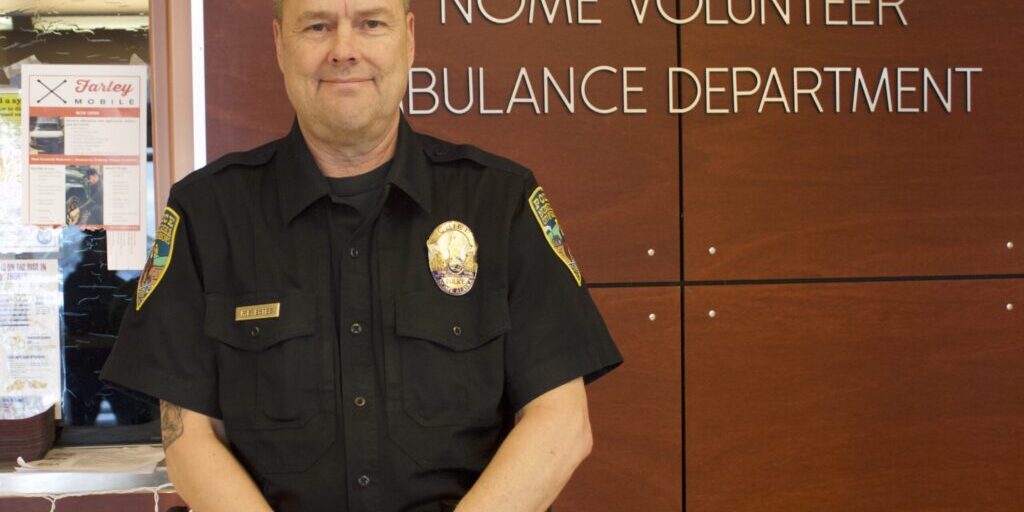For more than a year, Nome community members have pushed the Nome Police Department to change the way sexual assault cases are handled. Now, the police department is auditing old sexual assault cases and moving forward with new training.
In part two of this two-part series, KNOM’s Emily Hofstaedter looks into the status of the current audit and continued citizen demands for accountability.
“The police department’s job is to investigate that crime, to do it professionally, to do it thoroughly, and do it accurately, and to submit that information to the DA.”
That’s Bob Pruckner, an investigator recently hired to work with NPD.
Pruckner is part of the new investigative team that Chief of Police Bob Estes brought up from Virginia to audit approximately 460 sexual assault cases, going back to 2005. That investigative team includes Jerry Kennon and Mike Heintzelman. Together, with part-time evidence custodian Paul Kosto, formally of the Alaska State Troopers, they investigate and audit current and former department cases. All are temporary positions, and Kosto is the only one with a background in Alaska law enforcement.
A case audit extending to 2015 is now complete, according to Chief Estes. Of those cases, 76 were sent for further review to the Nome District Attorney John Earthman.
“I know they’ve put a bunch of time in it. I’ve put a bunch of time into what they’ve sent over to me just to make sure those referrals are closed out in my system… reviewed and closed out.”
A public memo from the Chief claims that 19 of those cases are open for further investigation. At that rate of 25%, NPD estimates that about 115 sexual assault cases going back to 2005 could require further investigation. Once those cases are completed, the department plans to do a similar audit with domestic violence assault cases.
With more investigating, is also coming more training. In February, Chief Estes requested that the FBI train NPD on investigating hate crimes and cases with potential civil rights violations.
“The agent in charge there flew out a team of agents here that sat down with us: not only to help train, but also provided us guidance that’s needed for us to present them with guidance for any type of case review that they need to see that could, that could, possibly involve civil rights violations.”
FBI Special Agent Joe Bieshelt confirmed that his team met with NPD in late February.
The Chief also claims that cultural training and understanding the region are a priority. Katirvik Cultural Center confirmed that the Chief and Investigators Heintzelman and Pruckner have gone through their training. In a January City Council meeting, officer Justin Le mentioned that NPD officers now go through trauma-informed sexual assault training with the Alaska Department of Public Safety.
Such training could be a step forward, but Nome civilians still seek concrete oversight and accountability. In December, the City Council approved funding for officer body cameras after months of citizen lobbying. Chief Estes claims that all police officers and community service officers have that equipment but doesn’t say if wearing them is a requirement.
And it’s difficult for residents to know that information because much of the NPD standard Operating Procedures Manual is redacted, or not available to the public. Community members have asked for an updated, unredacted manual, and according to the Chief, an updated copy is still under internal review.
For some, NPD has undergone enough change to warrant advocating for more resources, including more police officers.
“I think he needs ten.”
That’s Lisa Ellanna of Nome, who has long demanded change in the police department and been a strong advocate for survivors of sexual assault. Her comments are a sharp departure from last summer, when some community members demanded NPD officers be fired.
Right now, the department is understaffed. The City budget authorizes seven patrol officers, but currently, there are six. The Chief would like the next year’s budget to include funds for ten officers. This way, he says, the police can respond to incidents in pairs while also having more time to complete thorough accurate reports after an incident, instead of rushing to the next call. He thinks more officers would allow for better, “proactive” community policing.
Even with her support of the public safety department, Ellanna diligently attends City Council meetings to advocate for greater police transparency and community involvement, especially between the predominantly white City government and the Alaska Native community.
And restoring community trust takes more than just a few months.
Clarice “Bun” Hardy formally worked as an NPD Dispatcher and was sexually assaulted in 2017. She claims the department never investigated her case.
Due to her negative experiences with NPD, she no longer lives in Nome but offers her own thoughts to help the department rebuild public trust.
“Being honest and connecting with the community…”
Concerned community members are doing their part to continue dialogue with the police department through a potential public safety commission. That still has to pass through City Council — but, if passed, it would be another resource for people who might not fully trust the Nome Police Department.
Image at top: Bob Estes, Chief of the Nome Police Department. Photo: Emily Hofstaedter, KNOM.




